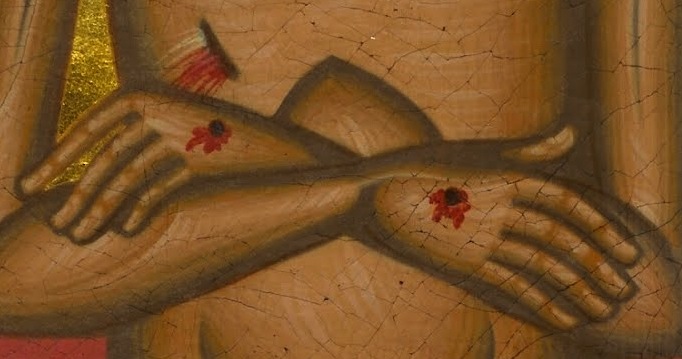April 23, 2006
John 20:19 – 31
There is not a verse of the scriptures that is wasted. Christians have always followed the example of the Jewish rabbis in believing that there is no verse of the scripture that is accidental. Every verse, every word, has significance for our lives. This is certainly true of today’s gospel. Jesus appears in his risen body to the disciples. Yet that body bears the marks of his passion, the nail prints in his hands, the gash in his side. Now the presence of those marks might at first seem to be simply the disciples describing what they saw. But the scriptures pay great attention to the marks. They even invite Thomas to touch them. From this we can be assured that their presence is much more then accurate description. They are meant to carry a message, a truth for our lives. The truth is this: there is power and life in woundedness.
In his risen body Jesus bears the marks of his passion. He does not hide them. He wants it to be clear to us that when we admit our sins, our mistakes, our failures, and our brokenness in light of his resurrection, they can lead to life. This truth is contrary to the normal way we approach our limitations. We all want to put our best foot forward. We want to promote our success and downplay our failures. We deny the mistakes that we make, the faults and wounds that we bear. But in doing this we move away from the truth of who we are. Whenever we act in a way that is contrary to what is real, it diminishes us rather then strengthens us.
Now Jesus is certainly not telling us that we should place our wounds on display, that we should flaunt our mistakes and failures. We all know people who have unfortunately built their identity around their weaknesses. We have met people who have told us way too much about their mistakes. But it can be healthy, in the right context and at the right time, to uncover our wounds and even to let others touch them. When we have lost someone through death, divorce, or rejection, we try to be strong. But we must also mourn. To shed tears is the first step towards healing. When we are afraid of something in our family, in our world, about our health, admitting that fear and letting someone we trust touch it does not harm us. Instead it prepares us for what lies ahead. When we have given in to our own selfishness when we have hurt someone through a word or a deed, it is not an embarrassment to say I was wrong. Saying I am sorry to our spouse, our children, our parent, our friend is a statement of truth that can open a new beginning. There is power in our wounds, a power that comes from the truth.
Occasionally someone has asked me as a priest when I hear confessions, do I ever end up thinking less of a person who has come in to confess a serious sin. I can honestly tell you that in over 30 years of priestly ministry that has never occurred. There is something powerful and holy about the honest admission of a fault in God’s presence. Contrary to making me think less of a person, it actually makes their dignity and their goodness easier to see. I always walk away from such encounters humbled and aware of God’s presence.
The risen Christ comes before us today bearing the marks of his passion. Jesus does not hide his wounds and neither need we. Admitting our imperfections, fears, doubts, and mistakes does not defeat us. It releases power for healing and for life. We do not need to deny the marks of our wounds. For we believe that God will change us as God changed Jesus. We trust that the marks of our wounds will become the marks of our glory.

